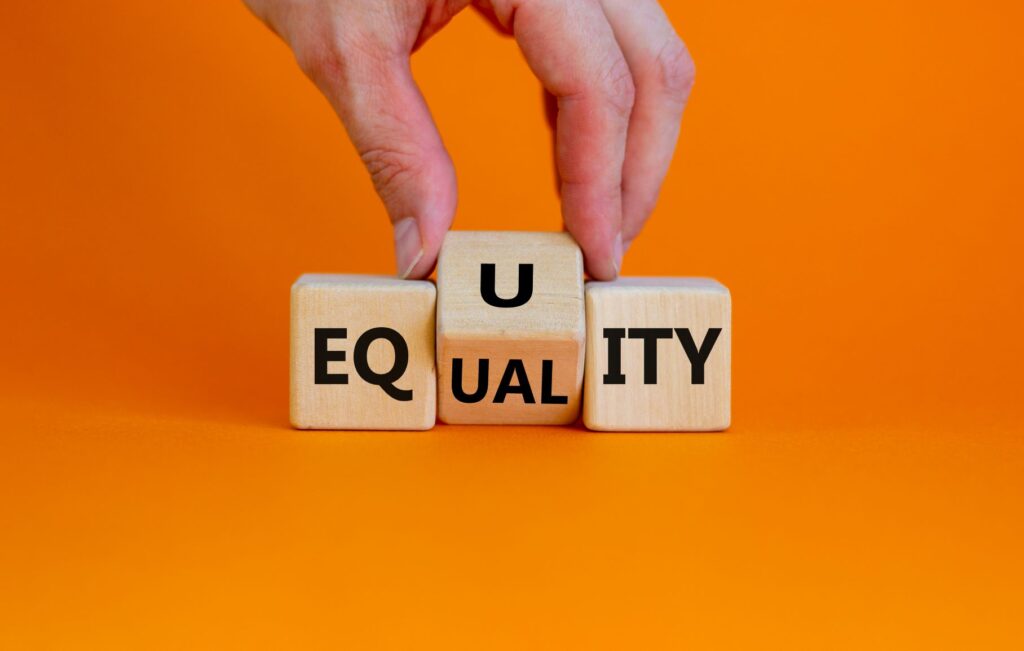An unexpected silver lining of the pandemic is “meeting equity,” or improved access to meetings for people who previously reported being left out. Although business was once informally carried out at the watercooler or after hours with just a smattering of team members present, remote working has meant all business must happen via video, with everyone present. In short, the era of video collaboration has succeeded in making the workplace more democratic.
Now we face a new challenge: How do we keep hold of the equity we’ve gained as we transition to hybrid working, returning once again to more in-person days at the office? The first step is awareness, not only of the steps we can take to maintain access to meetings but also of all the other kinds of equity we need to keep top of mind. Here are three to get you started.
#1 Communication Equity
We all know listening to each other is important, but we don’t all walk the walk. Video meetings have truly highlighted that fact. Our ability to listen effectively relates to our personal communication style, the two most common being:
- Task-oriented style—Great at raising questions, making decisions, and ensuring conversation keeps moving at a good pace. Their driving motivation is to get things done, but the flip side is they will butt in and talk over others to get there.
- Facilitative-oriented style—Good at making all teammates feel appreciated and creating space for everyone to have his or her say. Their main objective is to get along with others, but this can leave them open to being steamrolled by more domineering types.
We can all make an effort to be more conscious of our communication style, dial up our listening skills, and dial down the interruptions. However, teams are most effective when they also adhere to some basic meeting etiquette. Whether you are at a physical, virtual, or hybrid meeting, be sure to raise your hand before you take the floor. This simple gesture shows everyone in the room the respect they deserve.
#2 Visual Equity
The sister of communication equity, visual equity ensures that everyone is seen and no teammates are overlooked if they happen to be working from home on a day when the rest of their teammates are meeting at the office. The easiest way to achieve visual equity is to include a video link in all meeting invites and always dial in wherever you are based that day. This way, you can’t accidentally leave someone out, and everyone always has a seat at the table, whether it’s a physical or virtual one.
You should also make a habit of selecting the gallery view feature, ideally on a device that automatically frames everyone’s face no matter where they are sitting in a room. If no one is out of sight, no one can be out of mind. Even your teammates in the back row at the meeting space have an equal chance to share ideas, be given tasks, and be spotted for opportunities.
#3 Energy Equity
The true definition of an extrovert is someone who replenishes his or her energy through being around others. When extroverts work in the office, they are in their element, but they don’t do as well when working from home and can suffer in terms of their mental health. The definition of an introvert is the polar opposite. Introverts recharge their batteries by being alone, so working from home in a quiet and cozy room alone suits them down to the ground, while being in the office is more taxing. Also, with open-plan environments come impromptu meetings and distractions.
Neither personality is better or worse; those in each group simply require different considerations from the people they work with in order to get the best out of them. If you are an extrovert, be sure to schedule meetings to bounce ideas off your teammates and absorb some of the buzz around a project. If you are an introvert, carve out some alone time in your day, and block it out in your diary. It’s all about knowing yourself and trying to get to know the needs and preferences of others.
Embrace and Shape the New World of Workstyles
Whatever working arrangement you currently find yourself in, whether that’s a hybrid model or fully back at the office, you have more power than you realize to make that format work for you and your team. Don’t shy away from talking about the things you like and dislike about new work styles and all the ways you want to nurture the equity you have now come to expect.
The “new normal” is still unfolding. All of us can shape it.
Hellene Garcia is the Head of Commercials at Neat.

